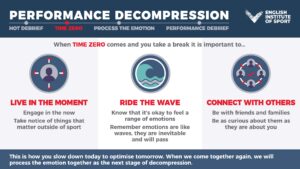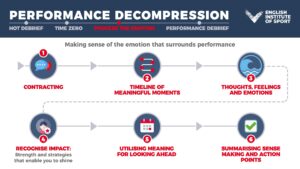Process the Emotion: The importance of Performance Decompression
As a summer of major sporting competitions comes to a close, several athletes have referenced a demanding period of performing and the potential need to take a longer break.
That’s why the Sport Psychology team at the English Institute of Sport (EIS) are encouraging athletes and staff to ensure they have decompressed optimally, to maximise preparation for the 2024 Paris Olympics and Paralympics.
Their message? If you are still referencing Tokyo and the five-year cycle, or if you had an intense period of performance this summer, you might want to consider your need to Process the Emotion to maximise your preparation for Paris.
With two years to Paris 2024, It’s not too late to make sense of the emotion that surrounds performance, so now is the time to reach out to the psychologist within your sport for help and guidance on this.
Performance Decompression consists of four phases – Hot Debrief, Time Zero, Process the Emotion and a Performance Debrief – with the EIS Psychology team facilitating guidance around ‘Time Zero’ (stage 2) and ‘Process the Emotion’ (stage 3).

More information on those stages, and Performance Decompression overall, can be found here.
There are several reasons why it’s important to decompress following an intense period of competition, including making sense of the experience, avoiding maladaptive emotional responses and being able to reset more quickly for the next major competition.
Now, as well as having designed a six-stage process (see below) to assist athletes, coaches and support staff in their decompression following the Tokyo and Beijing Olympic and Paralympic Games, the EIS Performance Psychology team have undertaken joint research with Liverpool John Moores University (LJMU), aiming to explore and better understand the impact felt by those athletes and staff who have undergone a period of Performance Decompression.

Reflections from athletes and practitioners, uncovered by the EIS-LJMU research, included:
- “I needed to work through and let my emotions out in order to move on.”
- “After I had processed everything, I couldn’t wait to return to training. I knew exactly what I wanted to do.”
- “It provided me space to talk freely, express my feelings and understand it’s OK to feel these emotions.”
- “Acknowledging the negative emotions took longer, but going through that process and talking about it allowed me to get there in a healthier way.”
- “It gave me clarity over my experience and what I had achieved, as well as what I had gone through to get to those experiences, and helped to put it all into context.”
Athletes, coaches, and staff who feel the need to process the emotion of the Olympics, Paralympics and Commonwealths, in order to better prepare for Paris, can reach out to the psychologist in their sport for more help and guidance.
More information on the EIS Performance Psychology team can also be found here.
EIS-LJMU research project leads
EIS: Danielle Adams Norenberg, Sarah Cecil, Faye Hodson
LJMU: Ollie Yeomans (MSc Applied Placement Programme), Professor Joanne Butt